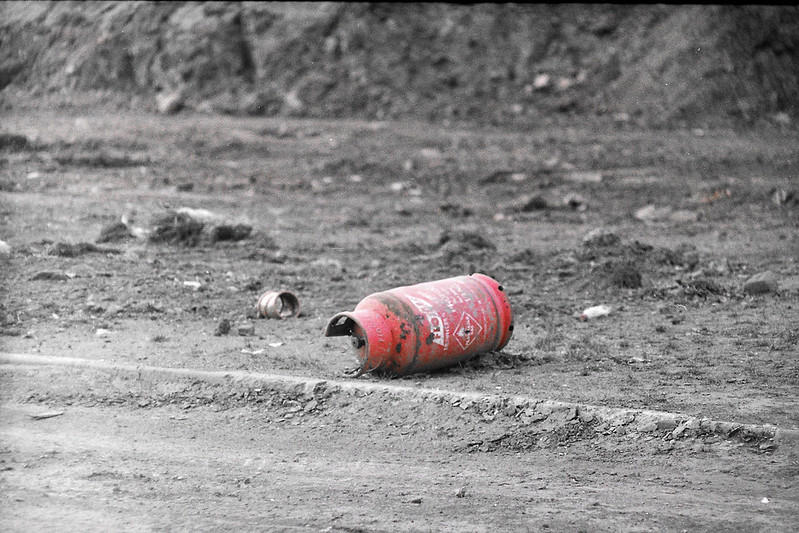When I was a little girl, my mom would call the domestic gas company and, about an hour later, a truck would come to replace the empty cylinder with a full one. In contrast, during my adult life, I have had to deal with the problems caused by the nationalization of the companies.
A couple of years ago, I went six months without domestic gas. The shortage at that time reached such an extreme point that it was very difficult to buy gas refills, even on the black market. During that time, I cooked on a small electric stove, dealing with power outages too.
One time, the electricity failed for twelve hours straight. Buying anything was difficult, the only solution was to eat bread and canned tuna, because at that time the use of dollars was not allowed and the scarcity of bolivars in bills made the processes complicated. Without electricity, the points of sale for debit cards did not work. That Sunday, I was lucky, I found some bills at home, enough for bread.
Venezuelans sometimes feel like we are inside a bad version of the game Jumanji. Here, everything unthinkable seems possible and nobody knows what the next big test will be. Keeping a positive and calm mind is difficult most of the time but we try, otherwise life would be an eternal moment of chaos, and it is impossible to live like that for more than 20 years. Maybe it would be easier to spend two hours inside Jumanji.
For some time now, the people in charge of domestic gas have been members of the community who collect and organize the delivery. There is no availability all the time, the truck comes every three, four or five months. It does not stop at every house; the cylinders must be taken to a collection point. The schedule is set by them, if people are busy that day, they lose their opportunity.
She buys gas on the black market, but she has to pay about ten times the real price
Firewood has become an option for those who do not have an electric stove or spend long days without electricity. A friend of my family decided to put a firewood stove in her backyard, because it is too complicated to get gas in the area where she lives.
She is asthmatic and the smoke affects her but, even so, she doesn’t stop. She has to eat. Sometimes, she buys gas on the black market, but she has to pay about ten times the real price. Although she has to tolerate the high temperatures and the smoke in her eyes and lungs, it is the only method she has found for when she has no electricity, at least as long as it is not raining.
Venezuela has the eighth-largest natural gas reserves in the world, but production is currently low. Approximately 90% of the country’s gas is linked to oil production, which also implies a drop in the extraction of the gas resource.
The problems began a few years after the nationalization of the companies and increased over time until reaching an acute shortage. Another issue is the low number of available cylinders, and a small percentage of homes with piped gas.
More than 80% of households in Venezuela depend on propane gas, due to the reduced system for piped distribution. Propane gas requires a more complex process for its extraction; poor production and distribution practices have led to shortages. One of the options proposed by experts is to increase pipeline distribution networks for methane gas, which is abundant and cheaper to produce.
But the problems do not seem to reach the ears of President Nicolás Maduro. While Venezuelans wait for months for domestic gas, he promised earlier this year to supply Mexico with the resource. A promise he cannot keep. In the past, former President Chávez offered, sold and gave it away without problems, when Venezuela enjoyed great abundance as a result of high oil prices; today, the country can barely subsist on its own.
The mental and emotional exhaustion caused by scarcity wears out the population. Everyone has to figure out how to get supplies or save the little resources they have. For those who have food businesses it gets even more complicated; if they buy on the black market, their expenses increase; if they can’t get any, they have to stop their sales.
It is not about resignation, it is about survival
For my part, I found a system. I cook most of my food on the electric stove. I only use the gas stove for foods that require more power or for hours without electricity. Two years ago, I learned my lesson: I should never run out of the resource. A few weeks after filling my gas cylinders, the country experienced two major electrical blackouts of five and four days each.
Some Venezuelans abroad criticize the degree to which Venezuelans have adapted to the circumstances. What they don’t understand is that from the inside, life is different. After years of attending protests, going to the polls and raising voices to denounce the situation, the population is exhausted. The tiredness will not last forever, periodically waves of protests break out and extend for weeks, but it is not always possible to fight, it is necessary to take strength. It is not about resignation, it is about survival.
Some are in the gasoline lines, others in the gas lines, others try to fill oxygen bottles, meanwhile, some civilians in an area of Caracas spend a few hours under the mattresses of their beds to avoid being hit by a stray bullet during the shootings of criminal gangs. That is what survival is all about.
Image credit: Stuart Cunningham

